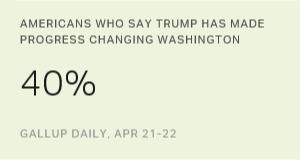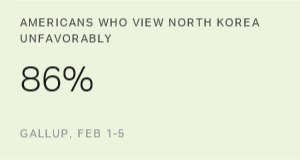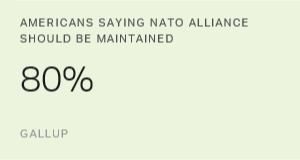Donald Trump's first overseas trip as president will take him to Saudi Arabia, Israel and the Vatican, then to Brussels for a major NATO meeting and back to Italy for a G7 summit. The world is watching with particular interest to see how his administration, subject to serial and serious controversy at home, will play out on the world stage.
Americans appear to believe that Trump has a challenge in front of him when it comes to improving the image of the U.S. among foreign leaders. ║┌┴¤═°'s annual foreign affairs update in February showed that Americans' views of how the U.S. rates in the eyes of the world are the worst in a decade, with 57% saying "unfavorably."
Most Americans favor an activist role for their country on the world stage, with a substantial majority saying that the U.S. should continue to play a major role in foreign affairs. As far as Trump's goals are concerned, Americans place most importance on preventing terrorism, stopping the spread of nuclear weapons and ensuring that the U.S. has a steady supply of energy.
What follows is a look at public opinion relating to the major stops on Trump's planned trip.
Saudi Arabia
Americans generally have a negative view of Saudi Arabia, which had a 31% favorable rating in ║┌┴¤═°'s February World Affairs poll, compared with a 65% unfavorable rating. Americans' over the past decade and a half. Although current views are more negative than over the past several years, they are about where they were in 2006, 2008 and 2009. In 2002, just 27% had a favorable view of Saudi Arabia.
As Trump meets with Saudi leaders, his base of Republicans will be holding just about the same attitudes toward the country as Democrats -- much different, as we will discuss below, from the large partisan gulf in attitudes toward Israel and the Palestinians. The similarity of views of Saudi Arabia across political lines is one of those infrequent instances in which U.S. partisan groups agree.
Trump visits a Saudi Arabia where residents -- and Saudi nationals in particular -- expressed a about their lives in ║┌┴¤═°'s World Poll survey last year. Nearly half of Saudi adults (48%) rated their current and future lives well enough to be considered "thriving" in 2016, up significantly from 35% a year earlier.
Saudis' buoyant life evaluations may reflect some of the excitement they felt surrounding the release of the kingdom's Vision 2030 roadmap last year, which includes a number of economic and social reform objectives. Among them -- and also likely of key interest to Americans and the Trump administration -- are plans to shift the kingdom away from its economic dependence on oil and bolster its leadership in the Middle East.
Israel and the Middle East
Trump's trip to Israel comes at a time when a new controversy has erupted concerning reports that he disclosed highly classified information to visiting Russian officials at the White House, and that the information ultimately had originated from Israel. Whatever the resolution of that issue, the president will be in a nation held in generally high regard by Americans. More than seven in 10 Americans view Israel favorably, and that positive opinion is even higher among U.S. Republicans.
Prime Minister Benjamin , with whom Trump is scheduled to meet, is held in lower esteem than the country he leads. Again, however, Republicans are much more positive about Netanyahu than are Democrats.
Trump is also slated to meet in Bethlehem with Palestinian leaders. The "Palestinian Authority" has a low 24% favorable rating in the U.S. -- with Republicans' opinion at an even lower 13%. Americans also remain much more sympathetic to the Israelis than to the Palestinians in the Middle East conflict.
There is little doubt that the issue of an independent Palestinian state will arise during Trump's trip. At this point, support for this idea is lukewarm among Americans, with slightly more in favor than against it. Support has drifted down in recent years, and this has become one of the more partisan issues ║┌┴¤═° measures, with 25% of Republicans supporting the idea compared with 61% of Democrats.
Opinions of U.S. leadership in Israel and the Palestinian Territories could not be more diverse. As they have during most of the past two presidential administrations, the majority of Israelis (53%) in 2016 approved of the job performance of U.S. leadership. This wealth of goodwill among Israelis may give the current administration some buffer against bumps in relations between the two countries -- including the most recent controversy.
This goodwill is in much shorter supply among Palestinians -- and has been for the past decade -- making Trump's message a tough sell to a highly skeptical audience. At its apex in 2010, 17% of Palestinians approved of U.S. leadership. In the last year of the Barack Obama administration, it was 11%, which is on the lower end of the 10-year trend.
Vatican
Trump is scheduled to meet Pope Francis at the Vatican after leaving the Middle East. That visit will be of particular interest to the 23% of Americans who identify as Catholic. U.S. Catholics as a group are neither particularly more positive nor negative about the president, nor unusually skewed in their party identification -- generally mirroring the national average.
║┌┴¤═°'s most recent update for the first half of May shows that Catholics' party identification is 37% Republican and 50% Democratic. This is roughly similar to the overall national adult sample for the same time period. Catholics in the U.S. in the first half of May gave Trump a 38% approval rating, compared with 40% for the same days among all Americans.
Catholics did tend to support Trump in the 2016 election in somewhat larger proportions than the nation as a whole. Exit poll data show that Trump received 50% of the Catholic vote last November, while 46% went to Clinton. Clinton won the national popular vote by a little over two percentage points.
║┌┴¤═°'s last measure of Americans' attitude toward Pope Francis was in the fall of 2015, after his visit to the U.S. in September of that year. The pontiff at that point enjoyed a high 70% favorable rating -- up from where it had been pre-visit. Trump's latest favorable rating among Americans is 44%, suggesting that the president in theory may benefit from his association with the highly popular pope.
Pope Francis by all reports differs significantly with Trump on several issues, including attitudes toward immigrants, refugees and climate change. The extent of and topics for discussion in their meeting at the Vatican are not yet known, although Pope Francis told reporters recently that he intends to be "sincere" when he meets with the U.S. president.
NATO
Trump's publicly expressed views on NATO have varied widely in recent months. In January, Trump called the organization "obsolete," but by April, he changed his mind and said that he no longer believes that it is obsolete. And, of course, Trump agreed to attend the organization's meeting in Brussels on his forthcoming trip.
Eight in 10 Americans say that the NATO alliance should be maintained, which is higher than when ║┌┴¤═° last asked this question about NATO in the 1990s. Democrats are more positive about NATO than Trump's fellow Republicans, although two-thirds of the latter group say that the alliance should be preserved.
Like Americans, residents in most NATO member countries that ║┌┴¤═° surveys in Eastern Europe also see the benefits of maintaining the alliance. Many residents, including majorities in Poland, Estonia and Lithuania, associate NATO with the . NATO allies, including the U.S., have recently sent troops to these countries to assuage security concerns after Russia's actions in Ukraine.
Russians, on the other hand, do not share this same view. And neither do residents of many countries in Russia's sphere of influence. Sixty-seven percent of Russians in 2016 viewed NATO as a threat, which is up 29 percentage points since 2012, and is the highest number that ║┌┴¤═° has recorded since it started tracking Russians' views on NATO in 2008.
G7 Summit
Trump is likely to face pressure from other G7 leaders in Sicily next week over whether the U.S. will or will not pull out of the global agreement to combat climate change -- a decision Trump has put off until after the summit.
In terms of U.S. leadership approval, Trump inherits relatively good ratings in other G7 countries from the Obama administration. Germany's 43% approval of U.S. leadership in 2016 is the lowest of the group, but placed in historical context, this is more than twice as high as the 19% rating in the last year of George W. Bush's administration.




